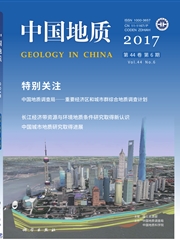

 中文摘要:
中文摘要:
铁木里克铁矿是西天山阿吾拉勒成矿带上一个高品位的磁铁矿矿床,赋存于石炭纪大哈拉军山组火山岩中。矿区围岩蚀变较弱,主要以低温热液阶段的绿泥石化和绿帘石化为主。根据野外矿石组构以及镜下观察,该矿床可以划分为四个成矿阶段。目前该矿床的研究程度较低,矿床成因存在较大争议。磁铁矿和赤铁矿的电子探针结果显示,该矿床的形成与岩浆-热液系统密切相关;辉石和角闪石的电子探针结果显示,辉石未发生蚀变,只有角闪石轻微地发生了阳起石化。矿石中的黄铁矿硫同位素(0.1‰-2.9‰)显示具有深源地幔特征,磁铁矿的氧同位素(-2.7‰-0.5‰)暗示岩浆热液对成矿具有重要作用,以及成矿晚期低温热液过程对早先形成的磁铁矿起到了改造作用。结合区域铁矿带的成矿地质特征,本文认为铁木里克铁矿的形成主要与岩浆-热液系统密切相关,在大量磁铁矿形成之后,有少量成矿流体与海水混合,对矿床和围岩进行了低温热液蚀变,形成了充填在磁铁矿矿石气孔中的赤铁矿和黄铁矿。
 英文摘要:
英文摘要:
The Tiemulike iron deposit is one of the deposits with highest-grade magnetite in the Awulale metallogenic belt and is hosted in volcanic rocks of the Carboniferous Dahalajunshan Formation. Its wall rocks have experienced a little alteration, mainly chloritization and epidotization. According to the ore fabrics and microscopic observation, mineralization of the deposit can be divided into four ore-forming stages. Since very insufficient work has been done in this aspect, the genesis of the deposit fails to reach an agreement. Magnetite and hematite electron microprobe analyses show that the deposit was genetically closely related to the magmatic-hydrothermal system. Pyroxene and amphibole electron microprobe analyses show that alteration of pyroxene is very weak, with only slight actinolitization of hornblende. Sulfur isotope from pyrite (0.1‰-2.9‰) indicates that the metallogenic material might have been derived from deep mantle. Oxygen isotope from magnetie (-2.7‰-0.5 ‰) shows that late epithermal ore-forming process played an important role in the reformation of the early magnetite. Combined with the geological characteristics of the metallogenic belt, this paper suggests that the Tiemulike iron deposit was mainly formed by the magrnatic-hydrothermal mineralization system; after the formation of a large quantity of magnetite, the remaining small amount of fluid was mixed with ocean water, resulting in a epithermal alteration process and leading to the filling of hematite and in the magnetite ore.
 同期刊论文项目
同期刊论文项目
 同项目期刊论文
同项目期刊论文
 期刊信息
期刊信息
